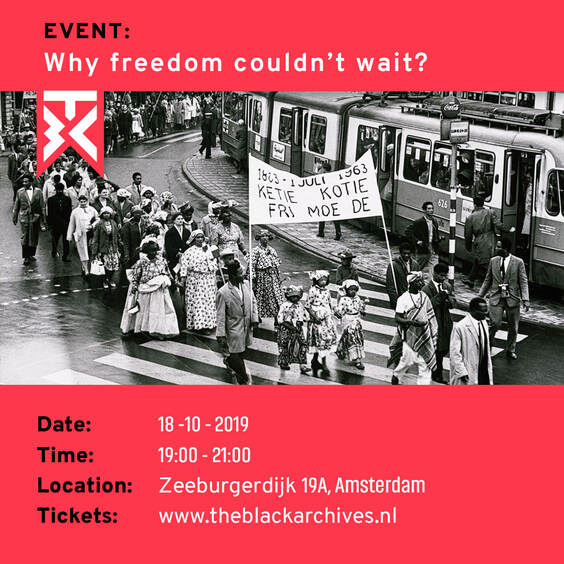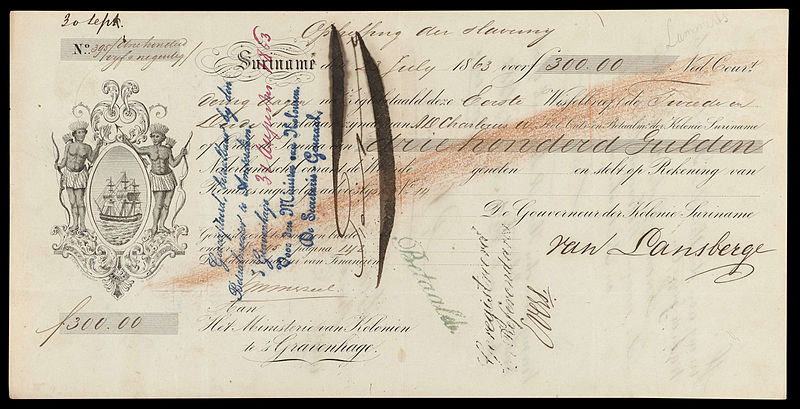Why Freedom Couldn’t Wait?
Why did the Dutch parliament abolish slavery in 1863? Why did they decide to abolish it under the condition that the emancipated people should work under State Supervision for 10 years and why did the enslavers get compensation?
On October 18, 2019, Dr. Kwame Nimako, Dr. Mano Delea and Drs. Mitchell Esajas will present the report 'Why Freedom Couldn't Wait' which they carried out on behalf of NiNsee about the parliamentary debate in the period before the abolition of slavery (1853-1863). This event is part of the Black Achievement Month.
When? Friday October 18th 2019
Time? 7 to 9 PM
Where? Vereniging Ons Suriname / The Black Archives
Registration? €5,- (excl. service costs)
Language: English
Why did the Dutch parliament abolish slavery in 1863? Why did they decide to abolish it under the condition that the emancipated people should work under State Supervision for 10 years and why did the enslavers get compensation?
On October 18, 2019, Dr. Kwame Nimako, Dr. Mano Delea and Drs. Mitchell Esajas will present the report 'Why Freedom Couldn't Wait' which they carried out on behalf of NiNsee about the parliamentary debate in the period before the abolition of slavery (1853-1863). This event is part of the Black Achievement Month.
When? Friday October 18th 2019
Time? 7 to 9 PM
Where? Vereniging Ons Suriname / The Black Archives
Registration? €5,- (excl. service costs)
Language: English
About the research
The research is an extension of a broader research project started by the late Dr. Glenn Willemsen, first director of NiNsee, and Dr. Kwame Nimako in 2005.
The first results of the research project were published by Glenn Willemsen (2006) in his book: ‘Dagen van gejuich en gejubel: viering en herdenking van de afschaffing van de slavernij in Nederland, Suriname en de Nederlandse Antillen’. The second part of the research project was published by Kwame Nimako and Glenn Willemsen (2011) under the title: The Dutch Atlantic: Slavery, Abolition and Emancipation. In this book they show how the slave trade and slavery was interwoven in economic, social and cultural elements, including nation-state formation, in the Netherlands and throughout Europe
The current project completes the analysis of the parliamentary debate by shedding more light on why a proposal to compensate the enslaved by a member of parliament was ignored while the call to compensate the enslavers was honored. It also sheds light on why a Staatstoezicht (apprenticeship) was introduced in Suriname but not in the Netherlands Antilles. Finally, it also gives us some insight in the thoughts about slavery by Dutch members of parliament and society at large in the mid-19th century Nederland.
The research is an extension of a broader research project started by the late Dr. Glenn Willemsen, first director of NiNsee, and Dr. Kwame Nimako in 2005.
The first results of the research project were published by Glenn Willemsen (2006) in his book: ‘Dagen van gejuich en gejubel: viering en herdenking van de afschaffing van de slavernij in Nederland, Suriname en de Nederlandse Antillen’. The second part of the research project was published by Kwame Nimako and Glenn Willemsen (2011) under the title: The Dutch Atlantic: Slavery, Abolition and Emancipation. In this book they show how the slave trade and slavery was interwoven in economic, social and cultural elements, including nation-state formation, in the Netherlands and throughout Europe
The current project completes the analysis of the parliamentary debate by shedding more light on why a proposal to compensate the enslaved by a member of parliament was ignored while the call to compensate the enslavers was honored. It also sheds light on why a Staatstoezicht (apprenticeship) was introduced in Suriname but not in the Netherlands Antilles. Finally, it also gives us some insight in the thoughts about slavery by Dutch members of parliament and society at large in the mid-19th century Nederland.



